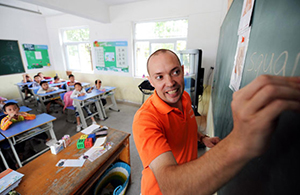The changing ground of human rights
(China Daily) Updated: 2012-12-14 08:04Editor's note: Experts from across the world were invited to present papers at the Fifth Beijing Forum on Human Rights, which focused on Science and Technology, Environment and Human Rights, in Beijing from Dec 12 to 14. Excerpts from some of experts' papers follow:
Is free Net a promotion or threat to rights?
Today one in three Internet users compares the right to free Internet access with the need for fresh air, water and food. Any restriction on accessing the world's information network is taken as deprivation of voting right or violation of the freedom of speech.
However, I am more worried about the challenges the Internet poses, firstly, to the rights of children, human honor and dignity. A person, especially a child, remains unprotected in the modern global network and can be a victim of criminals, swindlers, preachers of hate, pedophiles, vandals, terrorists, dishonorable journalists and/or spin doctors that specialize in black PR; influence of advertising on the subconscious; and dissemination of pornographic videos. Protecting honesty and dignity in these days of indecent online media is not at all easy and sometimes even impossible because of the lack of clear protection mechanisms and legal liability.
I believe that protecting children from the Internet is an urgent need, which can be addressed only if a government uses a comprehensive approach to manage the Internet. Examples of national policies for creating a safe environment on the Web include practices in France, England and Canada, which have established legal responsibility systems; the practice in Italy, where the Association of Safe Internet Providers has a wide scope of operations, and the practice in Russia, where the Safe Internet program has been in place at the national level with different versions for government institutions and home Internet users.
A particular threat that emerges when cyberspace is used to carry out acts of terrorism, destabilize the public order in countries and undermine their sovereignty and independence, or when one country exploits the Internet in a cyber war against another nation. Also dangerous is the creation of software that spread information illegally on the Internet without any control over its sources and contents - for example, an "underground Internet".
It is a policy of double standard that exercises stringent control over free Internet access for "domestic use" and calls for free unlimited Internet for "exports" to other countries. But a country is indeed using double standard if its government advocates freedom of public access to cyberspace in other countries and exercises total control over people in its own country and collects their personal information without their consent.
The fight for the control over the Internet under the pretext of promoting freedom of information veils the fight for the control over natural and human resources, markets and money.
This situation calls for controlling the spread of information in cyberspace and setting up an international legal framework to regulate information-related activities.
I believe the problem can be solved only if the United Nations establishes an international agency that, with the consent of all member states, would devise an international legal framework to regulate relations in cyberspace. Therefore, we need to support the initiative of countries to establish such an international legal framework under the aegis of the UN to regulate information activities on the Internet.
Nina Karpachova is a member of the board of the European Ombudsman Institute, and vice-president of the Union of Lawyers of Ukraine.












